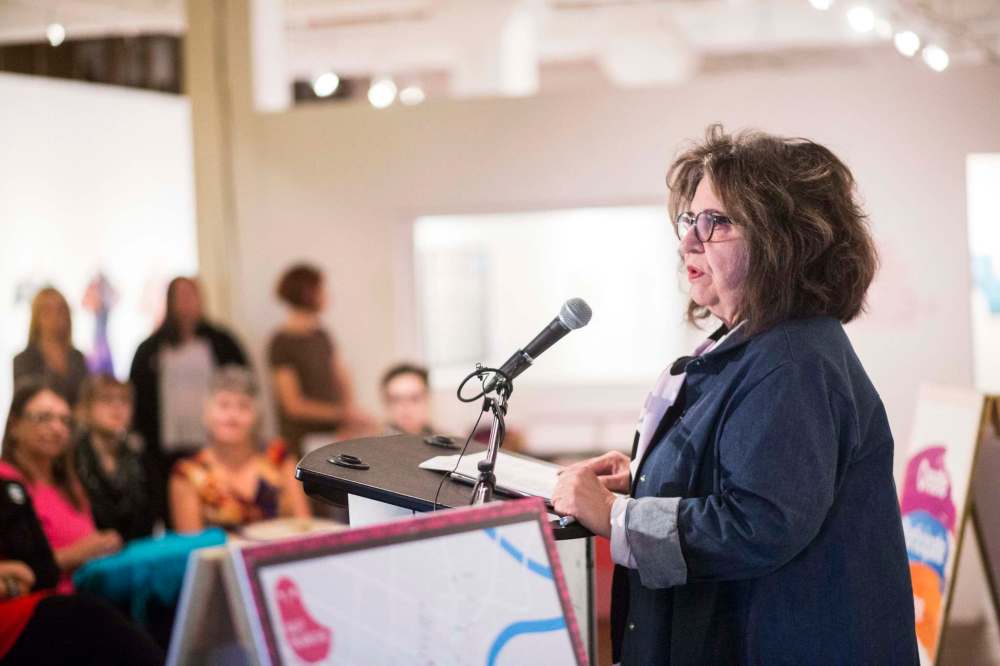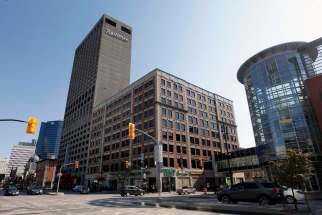Non-profits decry city’s plan to cut funding
Read this article for free:
or
Already have an account? Log in here »
To continue reading, please subscribe:
Monthly Digital Subscription
$19 $0 for the first 4 weeks*
- Enjoy unlimited reading on winnipegfreepress.com
- Read the E-Edition, our digital replica newspaper
- Access News Break, our award-winning app
- Play interactive puzzles
*No charge for 4 weeks then billed as $19 every four weeks (new subscribers and qualified returning subscribers only). Cancel anytime.
Read unlimited articles for free today:
or
Already have an account? Log in here »
Hey there, time traveller!
This article was published 09/03/2020 (1655 days ago), so information in it may no longer be current.
BALANCING the budget could come at a steep cost for community groups across Winnipeg, as the city looks to cut grant funding for several non-profits whose work has been deemed extraneous to the city’s core priorities.
Winnipeg’s multi-year preliminary budget, released Friday, proposes widespread cuts to the community services sector, including a 10 per cent reduction to nearly all of its annual grants, with the exception of those the city deems to be providing services on its behalf, or groups that have a long-term arrangement with the city.
The hardest hit comes for the Winnipeg Arts Council (WAC), which will see its city grant cut from $4.65 million in 2019 to $4.18 million in 2020, and its public art strategy fund axed entirely by 2021.

“It’s a sad legacy for a city government to eliminate arts funding,” executive director Carol Phillips said in an interview Tuesday.
Phillips said the brunt of the nearly $500,000 in cuts will be shouldered by Winnipeg’s arts community, which will see losses in grant funding doled out through the WAC.
During a “Budget for Breakfast” event with the Winnipeg Chamber of Commerce on Monday, Chamber president and CEO Loren Remillard said the city’s decision to cut community group funding was part of an effort to prioritize “core services” in Winnipeg.
Support for arts maintained, insists mayor
Mayor Brian Bowman said Tuesday that while the cuts to the Winnipeg Arts Council present a budget challenge, the city is making up for it in other corners of the budget.
Mayor Brian Bowman said Tuesday that while the cuts to the Winnipeg Arts Council present a budget challenge, the city is making up for it in other corners of the budget.
“Overall support for the arts is something that’s maintained in this budget and we’re continuing to make sizable investments at a time when balancing the budget for four years is not easy,” Bowman said.
“I would caution you from looking at that in isolation and not recognizing the other investments that we are making in public art.”
Bowman listed a few choice investments the city plans to make in public art, including $5 million in funding to the Inuit Art Centre and another $3 million to Kildonan Park’s Rainbow Stage.
He noted the city’s new multi-year budget deliberations will help groups plan better than previous year-to-year processes.
“Yes, there is a default 10 per cent reduction in the current grants, but there’s also funding certainty for four years so organizations can leverage that investment, they can know in advance this is the commitment the city is intending to make on a go-forward basis and hopefully they can leverage that for support from other levels of government,” Bowman said.
“That means some of the services the city has historically provided that aren’t really core services, they’re nice, but not essential to running the city, those ones are going to see reduced or no funding,” Remillard said in an interview Monday.
For Dorota Blumczynska, executive director of the Immigrant and Refugee Community Organization of Manitoba (IRCOM)— which is set to lose around $7,400 under the new budget—this explanation falls short.
“Core services are the services that support the people, and community grants support the most disadvantaged people within our communities,” she said.
“The reality is that there is enormous evidence that shows that it’s the provision of quality community services…that actually builds safer and more resilient and healthier and more prosperous communities for all.”
The city’s preliminary budget sets an expenditure growth target for community services at 0.5 per cent per year, meaning deep cuts are needed to balance the books.

Public service initially recommended more than $16 million in expenditure reduction options—including closures to pools, libraries, arenas and more—but after outcry from Winnipeggers the city opted to keep the lights on at all currently open facilities, and accepted approximately $4.7 million in cuts instead. Keeping facilities open means the community service budget is already expected to well exceed its 0.5 percent annual growth cap by 2023.
When initial cut recommendations were made in November, some groups saw themselves at risk of losing their grants entirely. Among them, Save our Seine—a non-profit that cleans up and advocates for the Seine River and surrounding natural areas—faced the possibility of losing a critical $30,000 grant from the city.
Like many other groups, Save our Seine pushed back, enlisting the help of their supporters to show up at public hearings, write letters to their councilors, and save the grant from elimination. One man even carried a canoe through downtown Winnipeg to raise awareness of the group’s importance, said executive director Michele Kading.
Save our Seine’s grant will still drop by $3,000 in 2020, which is a loss Kading said they hope to absorb by doubling down on fundraising efforts.
Other affected groups include community art space Art City, which will see a loss of nearly $15,000 in 2020, Main Street Project, which will lose $9,600 and Rossbrook House youth center, which faces more than $25,000 in grant cuts.
Groups including IRCOM and Art City have also said they’ll be turning to Winnipeggers to help make up the funding gaps, though Josh Ruth, managing director at Art City, said his organization’s funding outreach is already stretched thin.
“It’s not like we haven’t already tried to turn over every stone,” Ruth said in an interview Tuesday.
At the very least, said Kading, the multi-year budget plan means Save our Seine and other community groups know how much funding they’re slated to receive through 2023, reducing some of the year over year insecurity community groups face in chasing down city funds—a point the mayor is happy to emphasize.

All in all, the city’s grant investments will drop from $77 million in 2019 to approximately $69 million in 2020, and are expected to drop to just shy of $63 million by 2023.
By contrast, the executive policy committee set the Winnipeg Police Service’s (WPS) expenditure growth target at two per cent, meaning the WPS could see “historic investments” increase from $289.4 million in 2019 to over $313 million by 2023. The city said this represents the largest share of Winnipeg’s tax-supported operating budget.
The preliminary budget won’t be approved until it’s voted on by council on March 25. In the leadup to vote day, the city will hold a number of standing committee meetings to hear from stakeholders, including a public delegation hearing on March 19.
julia-simone.rutgers@freepress.mb.ca
Twitter: @jsrutgers

Julia-Simone Rutgers
Reporter
Julia-Simone Rutgers is a climate reporter with a focus on environmental issues in Manitoba. Her position is part of a three-year partnership between the Winnipeg Free Press and The Narwhal, funded by the Winnipeg Foundation.
Our newsroom depends on a growing audience of readers to power our journalism. If you are not a paid reader, please consider becoming a subscriber.
Our newsroom depends on its audience of readers to power our journalism. Thank you for your support.









